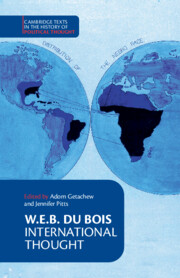Book contents
- W.E.B. Du Bois: International Thought
- Cambridge Texts In The History Of Political Thought
- W.E.B. Du Bois: International Thought
- Copyright page
- Contents
- Figures
- Acknowledgments
- Note on the Text
- Democracy and Empire
- Select Chronology of William Edward Burghardt Du Bois
- Book part
- 1 The Present Outlook for the Dark Races of Mankind (1900)
- 2 To the Nations of the World (1900)
- 3 The African Roots of War (1915)
- 4 Of the Culture of White Folk (1917)
- 5 Letter from W. E. B. Du Bois to President Woodrow Wilson (1918)
- 6 To the World (Manifesto of the Second Pan-African Congress) (1921)
- 7 Worlds of Color (1925)
- 8 Liberia and Rubber (1925)
- 9 Liberia, the League and the United States (1933)
- 10 Where Do We Go from Here?
- 11 Inter-Racial Implications of the Ethiopian Crisis: A Negro View (1935)
- 12 The Clash of Colour: Indians and American Negroes (1936)
- 13 The Union of Colour (1936)
- 14 What Japan Has Done (1937)
- 15 Black Africa Tomorrow (1938)
- 16 The Realities in Africa: European Profit or Negro Development? (1943)
- 17 Prospect of a World without Race Conflict (1944)
- 18 Colonies and Moral Responsibility (1946)
- 19 A Cup of Cocoa and Chocolate Drops (1946)
- 20 An Appeal to the World: A Statement of Denial of Human Rights to Minorities
- 21 Colonies as Cause of War: Address to the World Peace Congress, Paris (1949)
- 22 On the West Indies: Address of Dr. W. E. B. Du Bois at the St. Thomas Chamber of Commerce (1952)
- 23 To the World Peace Council, Budapest (1953)
- 24 Colonialism and the Russian Revolution (1956)
- Index
11 - Inter-Racial Implications of the Ethiopian Crisis: A Negro View (1935)
Published online by Cambridge University Press: 10 November 2022
- W.E.B. Du Bois: International Thought
- Cambridge Texts In The History Of Political Thought
- W.E.B. Du Bois: International Thought
- Copyright page
- Contents
- Figures
- Acknowledgments
- Note on the Text
- Democracy and Empire
- Select Chronology of William Edward Burghardt Du Bois
- Book part
- 1 The Present Outlook for the Dark Races of Mankind (1900)
- 2 To the Nations of the World (1900)
- 3 The African Roots of War (1915)
- 4 Of the Culture of White Folk (1917)
- 5 Letter from W. E. B. Du Bois to President Woodrow Wilson (1918)
- 6 To the World (Manifesto of the Second Pan-African Congress) (1921)
- 7 Worlds of Color (1925)
- 8 Liberia and Rubber (1925)
- 9 Liberia, the League and the United States (1933)
- 10 Where Do We Go from Here?
- 11 Inter-Racial Implications of the Ethiopian Crisis: A Negro View (1935)
- 12 The Clash of Colour: Indians and American Negroes (1936)
- 13 The Union of Colour (1936)
- 14 What Japan Has Done (1937)
- 15 Black Africa Tomorrow (1938)
- 16 The Realities in Africa: European Profit or Negro Development? (1943)
- 17 Prospect of a World without Race Conflict (1944)
- 18 Colonies and Moral Responsibility (1946)
- 19 A Cup of Cocoa and Chocolate Drops (1946)
- 20 An Appeal to the World: A Statement of Denial of Human Rights to Minorities
- 21 Colonies as Cause of War: Address to the World Peace Congress, Paris (1949)
- 22 On the West Indies: Address of Dr. W. E. B. Du Bois at the St. Thomas Chamber of Commerce (1952)
- 23 To the World Peace Council, Budapest (1953)
- 24 Colonialism and the Russian Revolution (1956)
- Index
Summary
This essay was published in October 1935, the same month Italy invaded independent Ethiopia and met little resistance from other members of the League of Nations. It reviews the conjoined evolution of racism and imperialism from the beginning of the modern era, until the First World War brought about a “revolution of thought in regard to race relations,” and “a new distribution of world power” appeared likely. The invasion of Ethiopia by Mussolini’s Italy will likely succeed despite weak efforts at mediation by the League of Nations. The invasion demonstrates the ongoing dangers for world peace of European imperial rivalry and portends similar expansion by Hitler’s Germany. The essay predicts that the “whole colored world,” seeing that neither Christianity nor international institutions restrain European states in their imperial exploitation, will soon come to the realization that their only hope lies in their solidarity against “race hate” and their willingness to resort to force to resist European exploitation. The gains achieved by Gandhi’s remarkable nonviolent resistance were modest; Italy’s success would destroy Indians’ tenuous faith in “the justice of white Europe.” Italy’s actions confirm that “Economic exploitation based on the excuse of race prejudice is the program of the white world.”
- Type
- Chapter
- Information
- W. E. B. Du Bois: International Thought , pp. 131 - 143Publisher: Cambridge University PressPrint publication year: 2022



